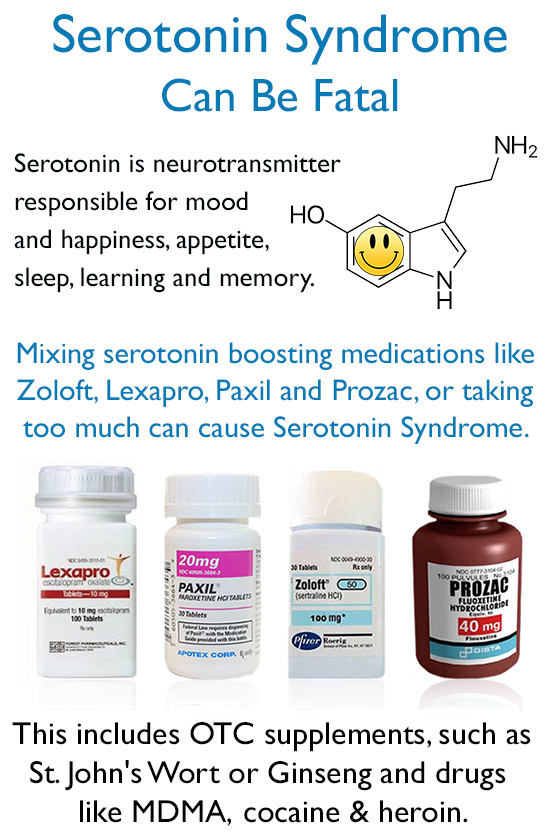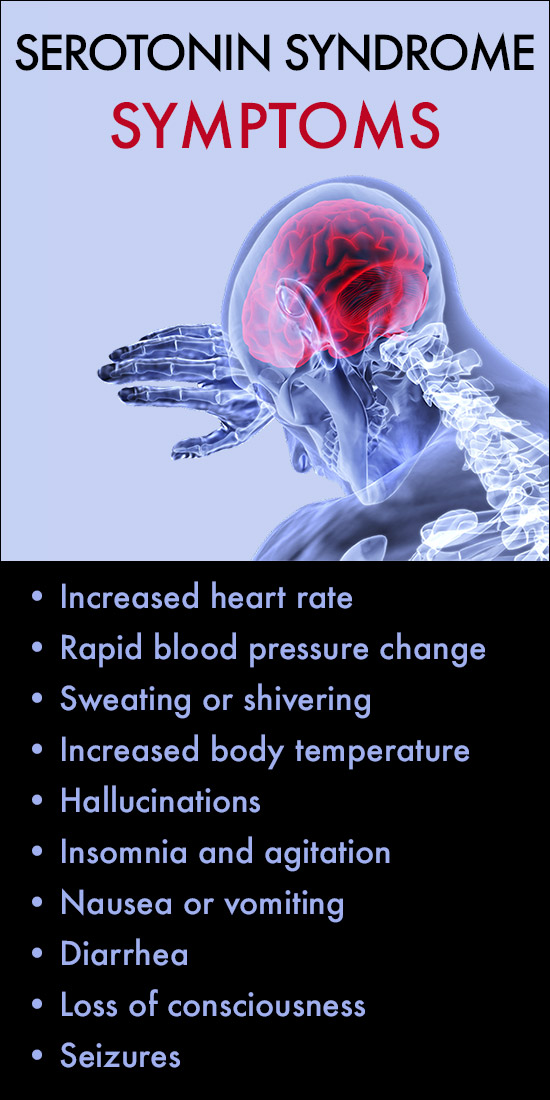With the popularity and necessity of so many antidepressant medications available on the market today, it’s important for people taking them to understand the potential dangers of serotonin syndrome.
Most adults in the United States, especially those that struggle with insomnia from time to time, are familiar with the word “serotonin.” The term conjures up a type of late-night infomercial catchall for the sleep deprived. In fact, serotonin is much more than that.
The effects of serotonin might also be well known to those who have been diagnosed with depression and are taking medications for it.
Most of the public’s awareness of serotonin revolves around not having enough of it, but having too much serotonin in the body can actually be fatal.
Serotonin Syndrome, according to the U.S. National Library of Medicine, most often occurs when two serotonin-producing medications are taken at the same, releasing too much of the chemical into the brain.
The vast majority of serotonin, a naturally occurring neurotransmitter, is found in the gastrointestinal tract.
Having the right levels of serotonin is important for a number of health reasons, including:
- Mood regulation
- Digestion
- Appetite
- Sleep
- Learning
- Memory functions
What Causes Serotonin Syndrome?
The most common cause of serotonin syndrome is mixing two drugs or medications that spike a person’s serotonin to dangerous levels.
It can also occur when a patient increases the dosage of an existing medication they’re using, unwittingly creating toxic levels of serotonin.
There are a lot of prescription and over-the-counter (OTC) medications that increase serotonin levels.
The most common prescription drugs for this are antidepressants called selective serotonin reuptake inhibitors (SSRIs). These include brand-name medications like Zoloft, Lexapro, Paxil and Prozac.
An estimated 16 million adults will struggle with depression every year, reports the Centers for Disease Control and Prevention (CDC). SSRIs are often the very first medication that physicians prescribe in these cases.
Other prescription medications that increase serotonin include:
- Monoamine oxidase inhibitors (MAOIs)
- Migraine and nausea prescriptions
- Certain types of painkillers
- Some cough depressants
Easily purchased over-the-counter supplements, such as ginseng and St. John’s Wort, are also known to increase serotonin levels.
This is not limited to prescription medications, and can also be caused by illegal street substances used recreationally that increase serotonin levels.
Illegal stimulants like MDMA, cocaine, and heroin flood the brain with the feel-good neurotransmitter serotonin too. This is one of the reasons these drugs are so addictive and why polysubstance-abuse is extremely risky.
Serotonin Syndrome Symptoms
Whenever talking a new medication prescribed by a doctor, it’s wise to pay attention to any side effects as discussed before beginning a treatment protocol.
Always be honest and upfront about any other medications or substances used on a regular basis that the doctor should know about. This includes disclosing alcohol or marijuana use and how often they are used. If there could be an issue, a different medication might be prescribed to avoid complications.
Most pharmacists will also explain any possible side effects and precautions when dispensing new prescriptions for the first time.
Symptoms related to serotonin syndrome are not just uncomfortable, they can also be deadly.
Some of these most common serotonin syndrome symptoms include the following:
- Increased heart rate
- Rapid blood pressure change
- Sweating or shivering
- Increased body temperature
- Hallucinations
- Insomnia and agitation
- Nausea or vomiting
- Diarrhea
- Loss of consciousness
- Seizures
While these are only some of the symptoms associated with increased levels of serotonin, it’s important to understand that some of them are often the normal side effects of using illegal drugs.
Because of this, the serotonin syndrome symptoms might be overlooked and not identified as something irregular or more severe until it’s too late.
Use Prescription Medications Only As Directed
Fortunately, because of the way many antidepressant medications work, they are not popular choices to be used recreationally.
Recreational drug users are usually looking for a quick high, and SSRIs and other types of antidepressant medications can take weeks or months to accumulate in the brain and begin working properly.
With that said, mixing them with other types of drugs like cocaine or MDMA can be very problematic and cause the brain to be flooded with serotonin way beyond safe limits.
This is why it’s imperative that anyone taking prescriptions should not mix other drugs while under the guidance of a doctor or therapist.
Many people use recreational drugs as a way to self-medicate to overcome the symptoms of depression and other mental health conditions. This might work temporarily, but in the long run, it will only make depression worse.
Prescription medications are designed to work with the brain to do their job, and they usually do it well when taken as directed.
Taking other drugs at the same can make the prescriptions ineffective. For this reason, many doctors will tell their patients not to mix prescriptions with other things like Lexapro and weed or alcohol.
Treatment for Serotonin Syndrome
Serotonin syndrome symptoms can appear very quickly, sometimes in a few minutes after taking a drug or medication. At other times they can take as long as several hours for the onset of symptoms.
If caught and diagnosed in time, the normal course of action for treating serotonin syndrome is to discontinue one or all of the medications until the symptoms subside, usually within 24 hours.
Waiting up to a day for the symptoms to subside can be a scary experience for many people, but it letting it run its course is really the only option.
The fatality rate is low, but it is possible, so always contact a prescribing physician at the first sign something is wrong whenever taking prescription medications.
One of the reasons there are few, if any, statistics related to serotonin syndrome is that when there’s a fatality, it’s simply categorized as a drug overdose without including any other specifics.
Becoming educated about the various types of medications and combinations of drugs that increase serotonin levels is a key to avoiding serotonin toxicity.
It also means that patients need to be upfront and honest with their physicians about any recreational drugs, supplements or other prescription medications they’re taking to avoid a deadly mix with prescribed medications.
Related:
Neurotransmitter Boosting Foods to Improve Overall Wellbeing
Neurotransmitters Balance Our Brain Chemistry
5 Feel Good Chemicals Everyone’s Brain Produces







